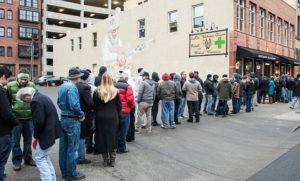Seven Reasons Why Delivery is the Future of Cannabis Retail
 There have been some interesting developments regarding applications for cannabis delivery services lately. Startups like Nestdrop have already come under fire, being slapped with a lawsuit from the city of Los Angeles before it could take off in that city. Eaze and Meadow are other offerings, both claiming to be the Uber of weed, promising quick and easy delivery from participating dispensaries. The problem is these apps are essentially glorified versions of the Yellow Pages and provide little more than marketing value (at a steep commission) to the dispensary. Unless you do business in a city dense with dispensaries to choose from, there is little incentive for you, as a dispensary, to sign up with such a service. They make big promises of convenience to consumers, and sit back collecting fees while the dispensary does all the work and has the onerous task of making that super-fast delivery, and tracking that inventory in another system. Eaze may work with a contracted team of drivers to make deliveries, but you need your own staff if you want to make deliveries to patients outside the app. And you must maintain at least two inventory lists: one in your system, one that’s referenced by the app. That becomes extremely inconvenient for the dispensary owner, and leads to problems for the consumer when they order something and find out later that it’s no longer in stock.
There have been some interesting developments regarding applications for cannabis delivery services lately. Startups like Nestdrop have already come under fire, being slapped with a lawsuit from the city of Los Angeles before it could take off in that city. Eaze and Meadow are other offerings, both claiming to be the Uber of weed, promising quick and easy delivery from participating dispensaries. The problem is these apps are essentially glorified versions of the Yellow Pages and provide little more than marketing value (at a steep commission) to the dispensary. Unless you do business in a city dense with dispensaries to choose from, there is little incentive for you, as a dispensary, to sign up with such a service. They make big promises of convenience to consumers, and sit back collecting fees while the dispensary does all the work and has the onerous task of making that super-fast delivery, and tracking that inventory in another system. Eaze may work with a contracted team of drivers to make deliveries, but you need your own staff if you want to make deliveries to patients outside the app. And you must maintain at least two inventory lists: one in your system, one that’s referenced by the app. That becomes extremely inconvenient for the dispensary owner, and leads to problems for the consumer when they order something and find out later that it’s no longer in stock.
A recent article in Cannabist suggests the delivery space is not necessarily fit for investors right now. I agree that apps like Meadow and Eaze are not where the market is headed (yet), and don’t carry a fully-baked value proposition. Yet having operated a successful delivery service for several years, I’d like to point out some key consumers whose needs will never be met by storefront dispensaries:
- Working-girl Wynona: People will always value the ease and convenience of having something delivered (hello amazon.com). Dispensaries often cater to a younger crowd; older consumers are seeking privacy, discretion and good service over a party atmosphere.
- Paranoid Peter: Not everyone wants to be seen in a dispensary making a purchase for something he still considers taboo.
- Housebound Hannah has mobility issues and can’t get to a storefront.
- Anti-social Alex doesn’t want to deal with people; he likes to order online and prefers text updates from the driver for a streamlined experience.
- Anxious Annie has a hard time making decisions in the presence of pierced and tattooed strangers. She feels overwhelmed with too many choices and wants to review an extensive menu from the comfort of her living room, free from a smoke-filled, bass-thumping vibe at the local 420 guys’ hangout.
- Loyal Linda: Has been using the same delivery service for years; even when a new dispensary opens nearby, she likes the selection and personal attention she gets when she calls her to place her weekly order.
- NIMBY Nancy: Like a significant majority of US voters, she thinks medical cannabis should be legal, but is less than enthusiastic about having a dispensary move in across the street.
Delivery services are an ideal solution for giving patients in legal states safe access to cannabis in cities and counties that want to ban dispensaries. There’s no reason they can’t be licensed and regulated like storefronts – with an unpublished address. Security concerns inherent with storefronts can be largely mitigated; and there’s no evidence that delivery services are just rogue/non-tax-paying smooth operators; you’re confusing us with white-collar criminals on Wall Street. Do you inherently feel your pizza delivery guy is more “shady” than the waiter at the pizza place? A delivery service can endeavor to be both discreet and fully compliant with the law.
The real need in the cannabis delivery app space is for a robust, user-friendly and, yes, specialized application that give start-ups a tools to manage their business, from inventory to patients to driver routing, with simplicity and transparency. Cannabis is an extremely complex plant; it makes sense that an application designed to connect consumers with this medicine in the most appropriate way would have some nuances that can’t be purchased off-the-shelf.
It also seems to be the case that regulations are slow to follow the will of the people. As state and local laws across the country are shaped and re-shaped, it’s quite possible that a well-regulated licensing scheme for delivery services would alleviate many concerns of storefront opponents and be an ideal compromise in the fight for safe access.
